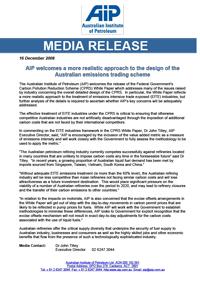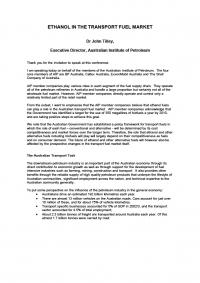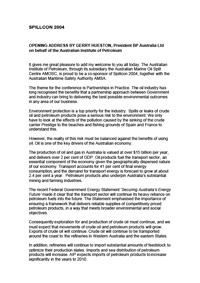Resources
Date
Description
Australia’s import, terminal and storage capacity for transport fuel has increased over time to meet growth in fuel demand There has been significant investment in new and expanded storage and terminal facilities over recent years to meet demand growth in key regional centres, as evidenced in…Date
Description
Relying on shipping (for imports) does not increase security risks, and shipping lanes are not easily disrupted. Most countries are reliant on movements of petroleum (crude and product) within and between countries, and particularly so for Australia (in both an export and import sense).…Date
Description
Australian refineries continue to operate with no indications of any plans to close the remaining four There have been statements and Inquiry submissions from all refining companies about their future refinery investment plans and the ongoing role of these facilities in meeting customer…Date
Description
Self-sufficiency in transport fuels is not necessary for supply security Security of supply is the result of resilient and efficient supply chains and robust risk management – it is not about self-sufficiency or independence from markets. There are 3 critical elements of any strategy to…Date
Description
AIP member companies provide very reliable supplies of fuel to the Australian market and: represent around 90% of primary fuel supply to the Australian market, have decades of operational experience in Australia and Asia delivering high quality fuel to customers, have major…Date
Description
The Federal Government has introduced regulation of the quality of petrol and diesel fuel in Australia. The principal drivers of the fuel quality regulation are environmental. The adoption of emerging vehicle engine and emission control technologies is a key strategy in the management of ambient…
Date
Description
The Australian Institute of Petroleum (AIP) welcomes the release of the Federal Government's Carbon Pollution Reduction Scheme (CPRS) White Paper which addresses many of the issues raised by industry concerning the overall detailed design of the CPRS. In particular, the White Paper reflects a more…Date
Description
The Executive Director of AIP, Dr John Tilley said "the release of the report by the Prime Minister's Emissions Trading Task Group provides a considered basis for the Australian community to increase its efforts to respond to the climate change challenge. This report outlines a clear set of…
Date
Description
Dr John Tilley, Executive Director of the Australian Institute of Petroleum, told the 2005 International Ethanol Conference in Brisbane today that AIP members see a role for ethanol as a fuel extender, replacing some fuel imports and helping to meet the growth in overall fuel demand, as well as a…
Date
Description
The Australian Institute of Petroleum today welcomed delegates to Spillcon 2004, the premier Marine Oil Spill Response conference in the Southern Hemisphere. The conference is sponsored by the Australian Marine Oil Spill Centre (AMOSC) and the Australian Maritime Safety Authority (AMSA). In…